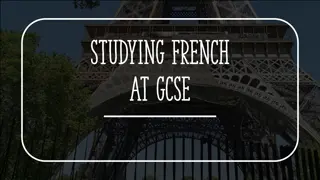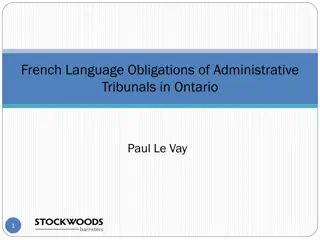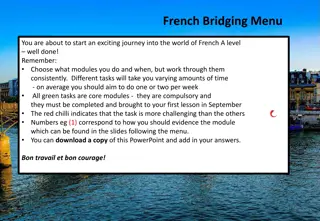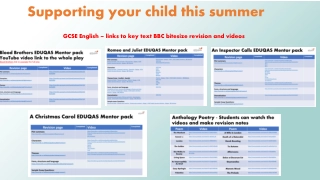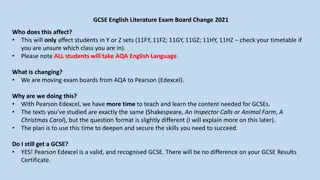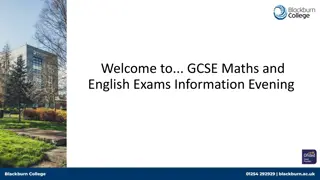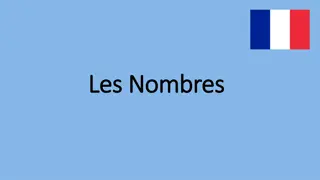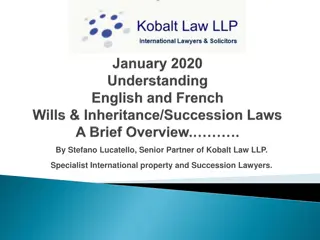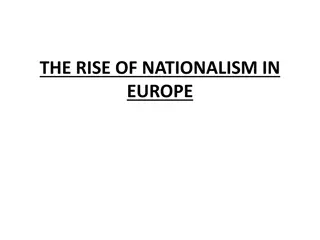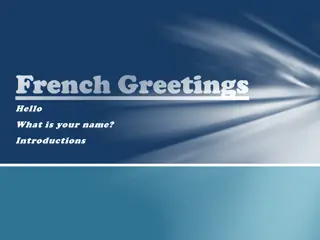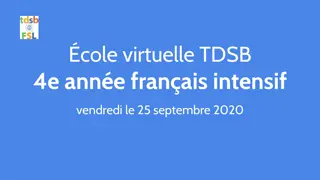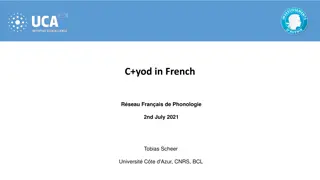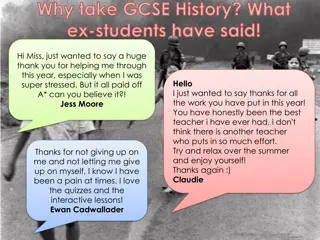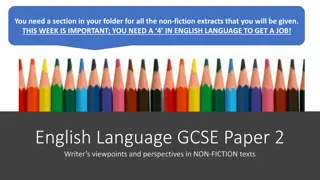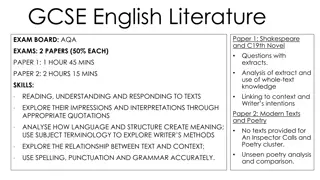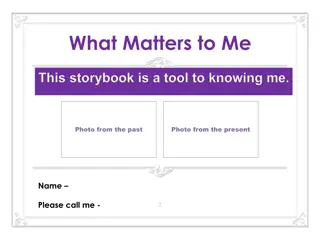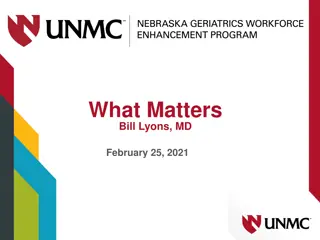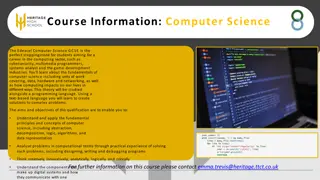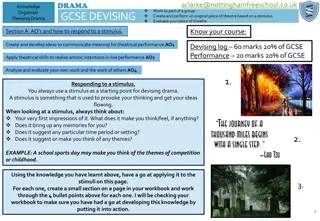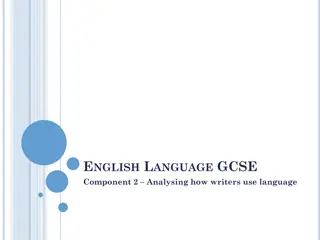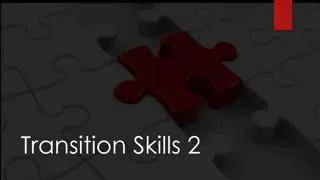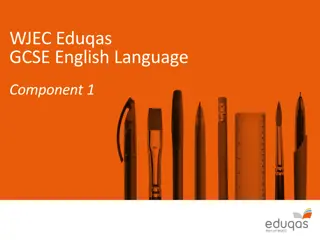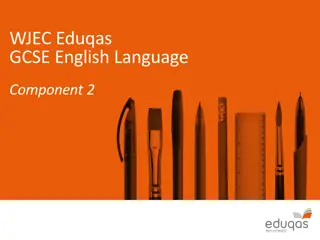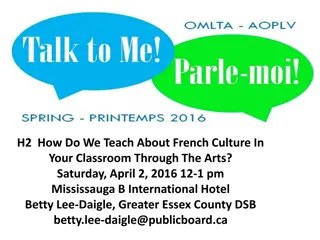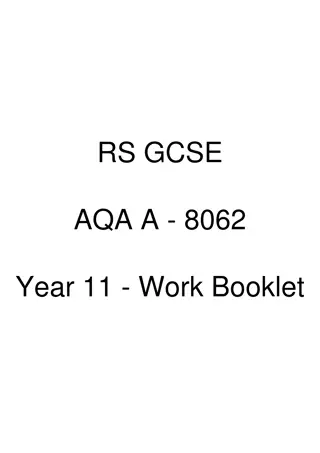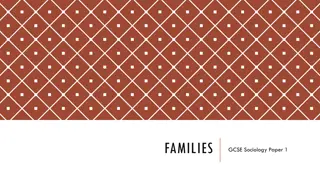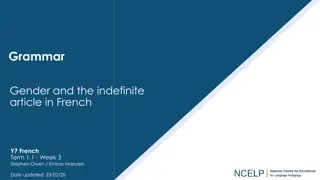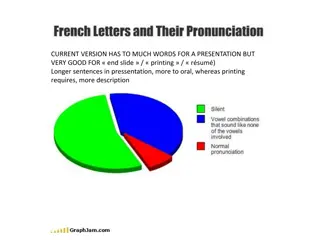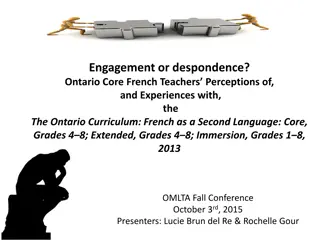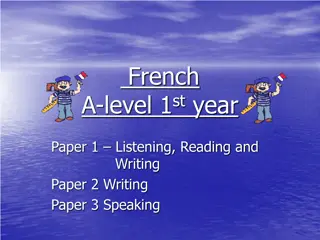Understanding French GCSE: What to Expect and Why It Matters
Exploring the French GCSE curriculum, assessment structure, success rates, and the value of language skills in a global context. Discover the benefits of studying French, beyond becoming a teacher, and why language proficiency is increasingly important post-Brexit.
Download Presentation

Please find below an Image/Link to download the presentation.
The content on the website is provided AS IS for your information and personal use only. It may not be sold, licensed, or shared on other websites without obtaining consent from the author. Download presentation by click this link. If you encounter any issues during the download, it is possible that the publisher has removed the file from their server.
E N D
Presentation Transcript
French GCSE French GCSE
What will I study? If you choose French GCSE you will study for the exam set by the WJEC. Scan this code or click on this link to go to the website for the WJEC where you can read all about the exam.
What will I study? The topics that you will study are similar to the ones that you have covered in Years 7-9 but we will look at them in more depth and learn more complex language. The topics are:- Identity and culture Wales and the World including France and French speaking countries Current and future study and employment
How will I be assessed? The grade that you achieve in French GCSE will be made up of marks from four different skills - reading, listening, writing and speaking. Each skill is worth 25% of your final mark and is assessed by an exam at the end of Year 11. A unique feature to French GCSE is that you can be entered for a mixture of foundation and higher tier exams depending on your particular skills e.g. higher reading if you are good at that but foundation writing if your skills there are not so strong. If you are entered for even 3 foundation tier and 1 higher tier paper you can still achieve a B at GCSE.
Will I do well? Over the past three years everybody who has chosen GCSE French has achieved at least a level 1 pass (D-G grade) with an average of 82% of pupils achieving an A*-C (level 2) pass. 2018 2019 2020 A*-C 100% 75% 72% A*-G 100% 100% 100%
Why should you take French at GCSE? Everybody speaks English anyway don t they? Actually only 6% of the world s population speaks English as their first language and 75% of people don t understand English AT ALL. 73% of UK businesses say that they need people with skills in a language other than English. These skills are in such short supply in the UK that 30% of these jobs have gone to candidates from overseas because the employer couldn t get a UK candidate with the required skills. Having language skills could mean that you earn between 8-20% more than your colleagues that s a lot over your whole career.
Im not taking French because I don t want to be a French teacher
Actually the opposite is true. Despite Brexit British businesses still need to sell goods and services to people all across the world. After Brexit I don t need to be able to speak French After Brexit many skilled linguists have decided to leave Britain so your skills will be even more in demand. 73% of UK businesses say they need people with language skills but only 30% of pupils take a language for GCSE. Be one of them and give yourself a competitive advantage.
I wont get a good grade if I take French 2018 2019 2020 These are the results achieved in French since the new style exam was introduced. A*-C 100% 75% 72% A*-G 100% 100% 100%
I dont need to learn French because I can just use Google translate.
What do Year 10 and 11 say about taking French? Studying French in school helps you with a new way of thinking and another way to express I would say it s great to learn French as it can open many opportunities. I ve taken French to give myself an advantage in the future over other people who can only speak one language. yourself. Taking French alongside subjects like maths and science demonstrates your commitment and determination. Learning French is a challenge to be overcome and one that can demonstrate your intelligence to universities. Revising for French can actually be fun as you can watch films in French.
Careers with Languages ps there s more to it than being a French teacher!
Here are some links to people who have studied languages explaining how it has helped them, how they use languages and the skills they have gained from studying languages. Ambulance dispatcher Wholesale fashion Medicine Careers Wales also lists other jobs that need languages at this page . Click on the jobs to find out more including the pay and job prospects...
Other jobs that people do with a qualification in MFL Oliver Stevenson, future leaders development programme, Barclays My degree course was really broad I studied everything from French marketing, to Catalan pop music and Mexican mural painting. In my third year I spent six months working for a market research company in Paris and three months in Argentina working as an English language assistant. I was based in a tiny city so I was treated like a local celebrity. After university I got an eight month internship with Eurostar International in their press office, where I used my French to communicate with French colleagues and to book journalists' travel. After that I applied for the Barclays graduate programme. There's a bit of a misconception you don't need maths or finance degrees to join this scheme. Barclays are after bright, entrepreneurial graduates. We have people with English, social sciences backgrounds, and I'm from languages of course. It's a two-year scheme with an intake of 100 people and you rotate across different departments. The salary is 36,000 a year. Recently I used my languages on a project to develop a closer working relationship with our colleagues in France and Spain. Oliver studied modern languages and culture (French and Spanish) at Durham University
Victoria Ferran, social media co-ordinator I did Russian, Latin, Spanish and French at A-level I was the first person at my school to do four language A-levels. I like how some languages have similar structures and I started Latin when I was 13. After university, I moved to London and did a few internships as I felt like I should get more office experience. I then started working for Lime&Tonic, an online start- up. I've been there 18 months now and I'm their global social media co-ordinator. I also started working for a community radio station last January which has led to freelance work with radio production companies. I think a language degree gave me a brilliant grounding for working in radio doing lots of literature analysis, you learn about narrative, structure and keeping an audience engaged. Also my language skills play a similar role in my social media job; communicating with people, being precise and using language effectively. I had no idea what I was going to do after uni, teaching wasn't for me nor was translation, but languages really helped me when applying for jobs. I think my degree shows multiple skills and that you can juggle many things. It keeps your options open. Victoria studied French and Spanish at the University of Oxford
Hannah Clark, international aid worker I struggled a bit with languages. I'm not a natural linguist so I had to work really hard to get good at it. I wasn't very inspired by my teachers, but when I was 14 I went to Colombia for three months with my family, because of my dad's work. I became really interested in Spanish it inspired me to think of languages more about the people who I could meet, rather than just learning it for school. During university I got the chance to go to Brazil. I ended up living in a favela for four months, doing charity work. That's where I got a taste for international aid work. It can be a relatively well paid sector, especially if you are based overseas, and languages like Arabic and French are always wanted. Quite a few old classmates are doing similar things to me. I've lived in Mozambique, worked in east Africa, and trained indigenous groups in the Amazon to use video cameras to campaign for their rights. Websites like charityjob.co.uk can help you find paid jobs, and bond.org.uk has good training courses. I think the best way in to international development is to get yourself overseas, start meeting people. If you're based in say, Lilongwe, Malawi, just from going out for drinks in the evening you can meet influential people from development agencies, which can lead to exciting opportunities. Hannah studied hispanic studies (Spanish and Portuguese) at Nottingham University
Jacob Gilbert, finance graduate, Royal Bank of Scotland I enjoyed Spanish at school and found I had a natural ability for the subject. I did it at GCSE and then for A-level along with maths and history. For university, I knew I wanted to do something mathematical, but I was also keen to pursue a language as I had always heard that it makes you more employable and being able to speak a second language appealed greatly to me. After researching I discovered a handful of universities that offered maths with a modern language as a joint honours degree. When I started university, there were six people doing maths with a modern Language. After the first year everyone but me had dropped the language in order to focus just on maths. Although juggling a joint honours degree was tough, I was determined to keep up the Spanish and in hindsight it was one of the best decisions I've ever made. I was able to live abroad in Spain during my third year on the Erasmus scheme. Students are given a grant as part of the Erasmus scheme, so I was financially much better off during that year. I would say that having studied a language, and having lived abroad, definitely helped me when it came to applying for jobs. Obviously my maths degree was the main factor in securing a job in the financial services sector, but I feel that having Spanish as well added another string to my bow and it made me stand out from other applicants. I think it showed that I wasn't just a numbers person, but that I also had strong communication skills. Having lived abroad meant that I had an appreciation of other cultures and meant I could get on with people from different backgrounds. Jacob studied maths with a modern language at the University of Manchester
Even more careers with Languages Step Ahead with Languages: Career Flyers This link will point you in the right direction towards a successful career. Each of the career leaflets accessed via the link below looks at how a language qualification will help you in this field and also give you hints and tips and useful websites so that you can do a bit more research. Use this resource to help you to use your languages to STEP AHEAD and succeed in the career of your dreams. https://bit.ly/3qqYwQX
I just cant believe I didnt get into the university I wanted to go to. I didn t realise they d want me to have a languages GCSE. Now what am I going to do?? Some final thoughts University University Admissions Admissions officers officers languages languages GCSE foreign language requirement at University College London UCL encourages intercultural awareness in all its students, and considers experience of learning a foreign language a vital element of a broad and balanced education. We wish to ensure that all of our graduates have had some experience of exploring another culture through language. and some universities will reject you straight away for any degree course if you don t have a GCSE in an MFL (Welsh doesn t count sorry) UK students who do not have a GCSE grade 5 (or grade C) or equivalent in a foreign language (other than Ancient Greek, Biblical Hebrew or Latin) on admission to UCL will be required to acquire an equivalent level of language proficiency once they are enrolled with us.
I cant believe she got the pay rise instead of me! And all because she can speak French to the people at our Paris offices Have French GCSE, will Have French GCSE, will travel travel
Any questions? Please feel free to email Madame Brace or Madame Vrigneau joanne.brace@willows.cardiff.sch.uk myriam.vrigneau@willows.cardiff.sch.uk


